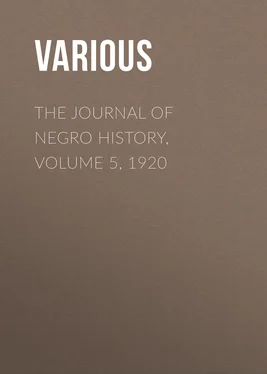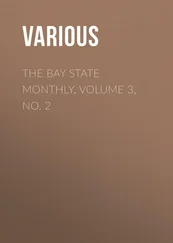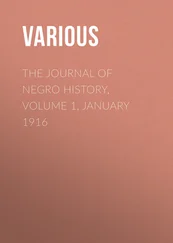Various - The Journal of Negro History, Volume 5, 1920
Здесь есть возможность читать онлайн «Various - The Journal of Negro History, Volume 5, 1920» — ознакомительный отрывок электронной книги совершенно бесплатно, а после прочтения отрывка купить полную версию. В некоторых случаях можно слушать аудио, скачать через торрент в формате fb2 и присутствует краткое содержание. Жанр: foreign_antique, periodic, История, foreign_edu, на английском языке. Описание произведения, (предисловие) а так же отзывы посетителей доступны на портале библиотеки ЛибКат.
- Название:The Journal of Negro History, Volume 5, 1920
- Автор:
- Жанр:
- Год:неизвестен
- ISBN:нет данных
- Рейтинг книги:4 / 5. Голосов: 1
-
Избранное:Добавить в избранное
- Отзывы:
-
Ваша оценка:
- 80
- 1
- 2
- 3
- 4
- 5
The Journal of Negro History, Volume 5, 1920: краткое содержание, описание и аннотация
Предлагаем к чтению аннотацию, описание, краткое содержание или предисловие (зависит от того, что написал сам автор книги «The Journal of Negro History, Volume 5, 1920»). Если вы не нашли необходимую информацию о книге — напишите в комментариях, мы постараемся отыскать её.
The Journal of Negro History, Volume 5, 1920 — читать онлайн ознакомительный отрывок
Ниже представлен текст книги, разбитый по страницам. Система сохранения места последней прочитанной страницы, позволяет с удобством читать онлайн бесплатно книгу «The Journal of Negro History, Volume 5, 1920», без необходимости каждый раз заново искать на чём Вы остановились. Поставьте закладку, и сможете в любой момент перейти на страницу, на которой закончили чтение.
Интервал:
Закладка:
W. H. Thomas—
Born in Ohio.
A man of brilliant intellect.
One of the most prominent members of the House of Representatives at the close of the Reconstruction Period.
I remember well the conspicuous part he took in the proceedings in the House of Representatives in 1876. Those were times that tried men's souls but Mr. Thomas held his own with the best men in the Democratic party.
Samuel Lee of Sumter, S. C.—
Born in South Carolina.
Delegate to the State Constitutional Convention.
A very strong character and one of the bright young men of the state.
He was elected to Congress but the Democrats counted him out.
He contested the seat and though the House was Republican and his case a good one, the Chairman of the Committee on Elections, a Republican from Indiana, who was personally antagonistic to him failed to report on the case and Congress adjourned without taking any action.
Jas. A. Bowley—
Member of the House of Representatives.
For one term he was chairman of the Committee on Ways and Means.
He wielded considerable power in legislation.
Was considered the "Beau Brummel" of the House.
F. H. Frost—
Born in South Carolina.
Member of the House of Representatives.
Active in all legislation.
Polished and highly cultured.
Henry J. Maxwell—
Born in South Carolina, at Charleston.
Senator from Marlboro County.
Active in all legislation.
Considered the best dressed member in the Senate.
Known to his associates at the "Duke of Marlboro."
W. H. Jones—
State Senator from Georgetown Co.
Quite a fluent speaker and well versed on all public questions.
On account of his bellicose nature he was given the sobriquet of "Red Hot Jones."
A. C. Jones—
Born in Washington, D. C.
Clerk of the House of Representatives during the whole Reconstruction Period.
A very capable officer and very popular.
Walter R. Jones—
Born in South Carolina at Charleston.
Graduate of Oberlin College.
Secretary of the State Financial Board, consisting of the Governor, Attorney General, State Treasurer and Comptroller, all white at that time.
Elected Clerk of the City Council of Columbia, S. C., by the unanimous vote of the members.
Resigned that position to accept the position of Private Secretary to Governor Chamberlain.
The best equipped and most brilliant young colored man I ever met.
J. E. Green—
Sergeant at Arms of the Senate during the whole Reconstruction Period.
A very efficient officer and a man of fine parts.
John Williams—
Sergeant at Arms of the House of Representatives during the whole period.
A very capable man and popular with the members.
There were many colored men who occupied positions of importance in the different countries—positions such as Sheriff, Treasurer, Auditor, Clerk of Court, Commissioner, Coroner and School Commissioner.
I never heard of any of them being removed for incompetency, dereliction of duty or malfeasance.
I regret very much that I cannot give you any information as to whether the men mentioned were free or slaves, as the persons from whom I could have gotten that information have all passed away. Had I received such inquiry eight or ten years ago I could have furnished it as there were several persons then living who, I know, were well posted on that subject.
Of the names noted in this paper the following were from the North.
Some of them may have been from the South originally and returned after the war: R. B. Elliott, D. A. Straker, Maj. M. R. Delaney, W. H. Jones, Dr. B. A. Bosemon, W. H. Thomas, H. W. Purvis, R. H. Gleaves, A. C. Jones, S. A. Swails, J. A. Bowley, J. E. Green.
The colored men of South Carolina played a more conspicuous part and held more offices of a high grade during the Reconstruction Period than the colored men of any other State.
South Carolina has the distinction of electing the first colored Congressman, (Joseph H. Rainey) and the last (George W. Murray.) 173
South Carolina was represented in Congress by eight colored men—Rainey, Elliott, Ransier, Cain, Delarge, Smalls, Miller and Murray.
Mr. Miller and Mr. Murray served after the Reconstruction Period and most of Gen. Smalls' service was after that period.
When I compare the present political leaders in South Carolina with those of the Reconstruction Period I must confess that we have retrograted politically. They may be due to conditions. Not only in South Carolina, but where would you find in any State at the present time, political leaders who can measure up to the caliber of Elliott, Rainey, Straker, Cardozo, Swails, DeLarge, Bosemon, Wright, Ransier, Lee, McKinlay, Cain, Whipper and Wilder?
When the Negro race can again produce political leaders of the type named then we may look forward with some degree of hope for a solution of the Negro problem.
Your idea in collecting data relative to the Reconstruction Period is a laudable one, and the wonder is, and the pity of it is, that it had not been thought of long ere this. There are very few now left to tell the tale, and that in a very unsatisfactory way.
Some of the data relative to the Congressmen I got from Congressional Directories. To recall all names, dates and incidents pertaining to the Reconstruction Period after a period of fifty years would require the prodigious memory of a Macauley, even had I been an active participant in political affairs at that time. There may be a few errors but they are of a minor character. I am glad that I am able to be of some assistance to you in this matter, however, little, and I can only say in the words of Macbeth,
"The service and the loyalty I owe,
In doing it, pays itself."
All names referred to in this paper are of colored men unless otherwise stated.
Mr. Monroe N. Work,
Editor—Negro Year Book,
Tuskegee Institute, Ala,
Dear Sir:
In reply to your letter of the 11th inst., I beg leave to state that Hunter and Dickson were white. As to Brokenton I probably was thinking of a Brockenboro in Washington and got the names mixed.
Before leaving Washington in 1913 I let Whitfield McKinlay have my book, "Reconstruction in South Carolina" by John S. Reynolds, to read. When I received your letters asking for assistance in getting the data relative to reconstruction in South Carolina I wrote to Mr. McKinley for the book. I wrote for it several times but not until about a month ago did he send it. I did not care to delay sending you the data, consequently I mailed it before the book came to hand. Had I received the book in time I could have made my paper a little more readable and avoided the errors referred to.
As you have, no doubt, taken data from the book by Reynolds I would like to correct a few errors I found therein.
Colleton—W. M. Vinery, should be Viney
Darlington—Richard Humbird, should be Humbert
Edgefield—John Wooley, colored, should be white
Greenville—Wilson Cook, should be Cooke
Kershaw—John A. Chestnut, should be Chesnut
Senate—
Chester—Lewis Wimbush, should be Lucius Wimbush
Union—H. W. Duncan, colored, should be white
This would make ten colored Senators
House of Representatives—
Abbeville—James Martin, white, should be colored
Charleston—B. A. Bosemon, should be Dr. B. A. Bosemon, Jr.
William R. Jervay, should be Jar vey
Читать дальшеИнтервал:
Закладка:
Похожие книги на «The Journal of Negro History, Volume 5, 1920»
Представляем Вашему вниманию похожие книги на «The Journal of Negro History, Volume 5, 1920» списком для выбора. Мы отобрали схожую по названию и смыслу литературу в надежде предоставить читателям больше вариантов отыскать новые, интересные, ещё непрочитанные произведения.
Обсуждение, отзывы о книге «The Journal of Negro History, Volume 5, 1920» и просто собственные мнения читателей. Оставьте ваши комментарии, напишите, что Вы думаете о произведении, его смысле или главных героях. Укажите что конкретно понравилось, а что нет, и почему Вы так считаете.












